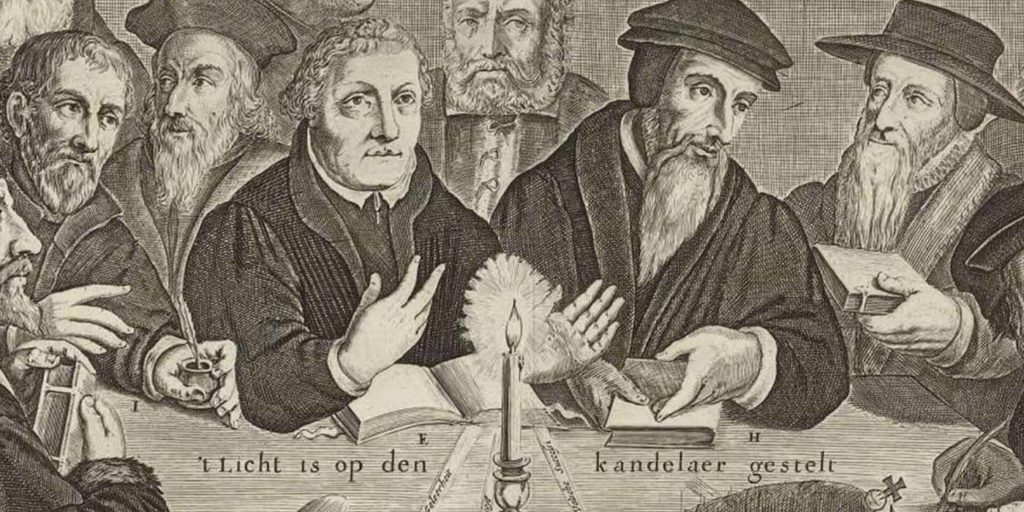
Barrett’s Book Notes: Justification, Reformation, Trinity, and Covenant
Michael Horton.  Justification, Two Volumes. Zondervan, 2018.
Justification, Two Volumes. Zondervan, 2018.
In every century since the Reformation the doctrine of justification has come under fire. But in our century the threats have become legion, creating theological confusion and biblical ambiguity. For that reason, Michael Horton’s two volumes are a Godsend. Not only does he retrieve the historical pedigree of justification but with exegetical rigor and theological precision, Horton reminds evangelicals why this doctrine still remains the hinge on which the Christian faith turns, as Calvin once said. Justification is the doctrine on which the church stands or falls and Horton’s magnanimous work will help the church stand yet another day. Scholar or pastor, student or churchgoer, here is a work on justification that is as comprehensive as it is faithful to the scriptures.
We live in a world that tells us to look within ourselves to find joy and lasting happiness. Problem is, looking within leaves us empty-handed, hopeless under the weight of our own unrighteousness. But Tim Chester has a message of remarkable hope. True joy is found in Christ and Christ alone. With help from the apostle Paul and the Protestant Reformers, Chester challenges the church today to return to the scriptures, for they are the swaddling clothes of Christ. There we will hear the call from Christ himself to put aside our worthless merit and trust in him alone for a righteousness he alone can provide. Only then will we rediscover joy that will not disappoint.
To be a Christian is to believe and trust in the atoning sacrifice of Christ. Yet what few Christians realize is that this passion of Christ, even the very words Christ prayed during his agony, are drawn from the psalms, specifically Psalms 113-118. With pastoral care and sobering conviction, Philip Ross reveals why these psalms became our Savior’s dying anthem. The reason why should move every reader to his or her knees in worship, praising God for the salvation he has accomplished through his Son, the Lamb of God.
Scott Christensen.  What about Free Will?: Reconciling Our Choices with God’s Sovereignty. P&R, 2016.
What about Free Will?: Reconciling Our Choices with God’s Sovereignty. P&R, 2016.
“Christensen very practically and persuasively develops a case for compatibilism. But whether you want to call it compatibilism, Calvinism, or something else, Christensen shows that it is just biblical Christianity. This book is an excellent resource, therefore, for those trying to make sense of divine sovereignty and human freedom from a biblical perspective.”
When I need help understanding the Bible, I turn to the Reformers. Their interpretations are relentlessly faithful, their insights profoundly pastoral, and their theology unfailingly biblical. For those reasons, don’t miss this fantastic opportunity to read the Bible with Calvin, Luther, Bullinger & Cranmer. With the Holy Spirit’s help, you will certainly walk away in awe of God and his gospel.
For decades John MacArthur has exemplified expository preaching, putting on full display the Word of God for the people of God. Now MacArthur, teaming up with Richard Mayhue and the Master’s Seminary faculty, has written a systematic theology, demonstrating how his verse-by-verse exposition naturally blossoms into a robust, colorful theological mosaic. This book is the theological dessert at the end of an expository meal. Regardless of your theological heritage, I encourage every Christian to sit under the doctrinal teaching of MacArthur and Mayhue. Certainly you will walk away saturated in Scripture, left in total awe after relishing the majesty and glory of our gracious God.
Gary Steward.  Princeton Seminary (1812-1929): Its Leaders’ Lives and Works. P&R, 2014.
Princeton Seminary (1812-1929): Its Leaders’ Lives and Works. P&R, 2014.
We live in a day when doctrinal novelty, particularly the kind that flirts with heterodoxy, is fashionable. As a result, biblical truth is compromised. If only evangelicals would listen and learn from Charles Hodge who could say that nothing new ever came out of Old Princeton! If you are serious about Reformed theology and being faithful to time-tested, biblically rooted doctrine–the kind Hodge could boast about–then look no further than Gary Steward’s introduction to Old Princeton. Steward’s work is a feast for those who are theologically hungry, and I know of no other book that makes Old Princeton more accessible, clear, and relevant for today’s layman. Certainly Steward’s book is the new go-to book for the reader unacquainted with the giants of Old Princeton.
J. V. Fesko.  The Trinity and the Covenant of Redemption. Mentor, 2016.
The Trinity and the Covenant of Redemption. Mentor, 2016.
When Christians reflect on the gospel, their attention is rightly drawn to the cross and empty tomb. But is this it? Or is there much more to the story? In a ground-breaking work, Fesko reminds us that the great news of this gospel message is rooted in eternity, whereby a covenant was made between the persons of the Trinity in order redeem sinners like you and me. Though it has sometimes been a forgotten doctrine of the Reformed faith, Fesko breaks the silence, retrieving the covenant of redemption afresh for a new generation. Undoubtedly, no theologian can afford to pass by this historical, exegetical, and theological mosaic.
How we understand the biblical covenants is a hotly debated issue. Unfortunately, the history of this debate has been restricted to covenant theology and dispensationalism. But now a better view has risen on the horizon, one that more accurately explains Scripture’s storyline. A pioneer book, Progressive Covenantalism guides us down a more faithful hermeneutical path, helping interpreters understand the nature of the new covenant in a way that does far more justice to the biblical and theological framework of the entire Bible.
 Reforming Joy: A Conversation between Paul, the Reformers, and the Church Today. Crossway, 2018.
Reforming Joy: A Conversation between Paul, the Reformers, and the Church Today. Crossway, 2018. a Dying Lamb: How Six Psalms (113-118) Became a Songbook for the Last Supper and the Age to Come. Christian Focus, 2018.
a Dying Lamb: How Six Psalms (113-118) Became a Songbook for the Last Supper and the Age to Come. Christian Focus, 2018. with the Reformers: 90 Days with Calvin, Luther, Bullinger and Cranmer. The Good Book Company, 2017.
with the Reformers: 90 Days with Calvin, Luther, Bullinger and Cranmer. The Good Book Company, 2017. and Richard Mayhue. Biblical Doctrine: A Systematic Summary of Bible Truth. Crossway, 2017.
and Richard Mayhue. Biblical Doctrine: A Systematic Summary of Bible Truth. Crossway, 2017. Brent E. Parker. Progressive Covenantalism: Charting a Course between Dispensational and Covenantal Theologies. B&H Academic, 2016.
Brent E. Parker. Progressive Covenantalism: Charting a Course between Dispensational and Covenantal Theologies. B&H Academic, 2016.
